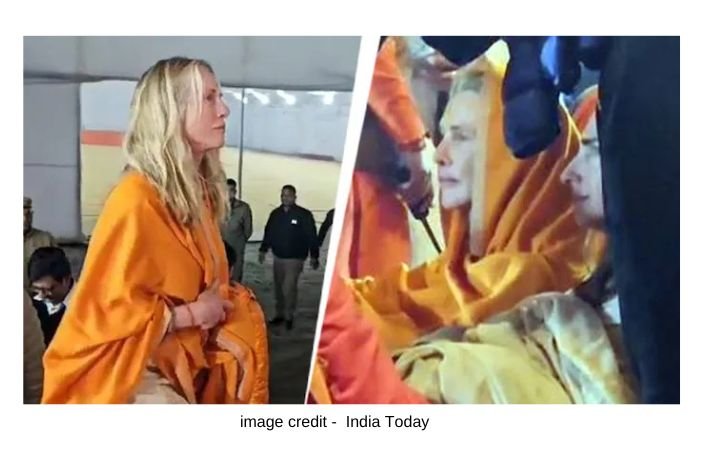Laurene Powell Jobs, a noted philanthropist and widow of Apple co-founder Steve Jobs, surprised everyone by appearing at the Maha Kumbh Mela, one of the largest spiritual gatherings in the world, held on the banks of the sacred rivers in India. She was seen wearing an Indian traditional outfit with an orange dupatta around her neck. The color signifies renunciation and spiritual awakening, sparking both curiosity and admiration alike.
The Maha Kumbh Mela: A Spiritual Gathering of Immense Significance
The Maha Kumbh Mela, more commonly known as the Kumbh, is a gargantuan event in Hinduism that attracts millions of devotees, ascetics, and tourists from around the world. The importance of Laurene’s visit to this spiritually intense and culturally rich festival goes beyond mere celebrity sightings. It gives insight into the global attraction of India’s spiritual traditions.
The Significance of the Maha Kumbh Mela
The Kumbh Mela is held every 12 years at four rotating locations: Prayagraj (formerly Allahabad), Haridwar, Nashik, and Ujjain. The event is rooted in ancient Hindu mythology, symbolizing the quest for spiritual purification and the search for immortality. According to legend, the gods and demons once churned the cosmic ocean to obtain the elixir of immortality. In this cosmic game of tug-of-war, four drops of this divine nectar fell in India, consecrating those places into holy pilgrimage spots.
This spectacle offers an immense vision of the nation’s spirituality and culture. Pilgrims take a bath in sacred rivers to free their souls from bad deeds committed in previous lives. The event fosters a collective assimilation of religious preaching, cultural amalgamation, and social communication, resulting in holistic self-transformation.
Laurene Powell Jobs’ Interest in India’s Spiritual Legacy
Laurene Powell Jobs’ attendance at such a significant event shows the growing interest of global leaders in spiritual and philosophical traditions that are not rooted in their own cultures. Her participation in the Kumbh Mela, clad in attires reflecting the spirituality of the gathering, highlights the general appeal of ancient Indian wisdom.
Laurene Powell Jobs: A Profile in Philanthropy and Global Citizenship
Beyond being the widow of Steve Jobs, Laurene Powell Jobs has made remarkable contributions to education, social justice, and philanthropy. As the founder and president of Emerson Collective, a social impact organization, she has worked toward immigration reform, education equity, and environmental conservation. Her work spans media, politics, and technology, making her a key global philanthropist.
This visit to the Maha Kumbh Mela reflects her keen interest in discovering varied cultures and spiritual practices across the globe. Laurene has often spoken about empathy and the importance of understanding global issues with compassion. By participating in the Kumbh Mela, she demonstrated a willingness to explore India’s rich spiritual heritage in an intimate way.
The Orange Dupatta: A Symbol of Spiritual Awakening
Laurene Powell Jobs’ attire was particularly noteworthy. The orange dupatta she wore is highly symbolic in Indian culture and religion. Orange or saffron is a sacred color in Hinduism, signifying purity, renunciation, and spirituality. It is often linked with monks and ascetics who have renounced worldly attachments to achieve enlightenment.
By wearing the orange dupatta, Laurene conveyed symbolic values such as humility and spiritual pursuit. Her respectful attire and behavior were appreciated by both pilgrims and event organizers, who viewed her gesture as an act of cultural appreciation.
Global Influencers Seeking Indian Spirituality
Laurene Powell Jobs is not the first global influencer to look to India for spiritual experiences. Spiritual seekers have long flocked to India, including celebrities like The Beatles, Mark Zuckerberg, Steve Jobs, and Oprah Winfrey. These visits often reflect a desire to reconnect with deeper truths and seek timeless wisdom from ancient Indian philosophies.
Steve Jobs, Laurene’s late husband, famously traveled to India in the 1970s in search of spiritual enlightenment. His journey to the ashram of Neem Karoli Baba in Uttarakhand is well-documented as a transformative experience that shaped his approach to life and innovation. Laurene’s visit to the Maha Kumbh could be seen as a continuation of that spiritual exploration, paying homage to the quest for meaning and purpose that her late husband embarked upon decades ago.
Spirituality Meets Social Change
Laurene Powell Jobs’ presence at the Maha Kumbh Mela also represents a connection between spirituality and social impact. Emerson Collective addresses critical global issues like education reform, climate change, and immigration rights. Participating in a spiritual experience like the Kumbh Mela could deepen her understanding of human interconnectedness and the universal search for meaning.
Indian spirituality teaches the concept of “seva,” or selfless service, which aligns well with Laurene’s philanthropic work. She believes that fulfillment comes through helping others, a principle that guides her mission for a more just and equitable world. Her experience at the Kumbh Mela might inspire future work, integrating spiritual insights into her approach to social change.
Reactions to Laurene Powell Jobs’ Visit
Laurene Powell Jobs’ visit to the Maha Kumbh Mela garnered widespread media coverage and social media attention. Pictures and videos of her performing rituals and interacting with pilgrims and spiritual leaders circulated online. Many people appreciated her respectful engagement with Indian culture and traditions.
Indian spiritual leaders and scholars also praised her attendance, noting that such visits help bridge cultural divides and foster a greater understanding of India’s rich spiritual heritage. Swami Chidanand Saraswati, a noted spiritual leader at the Kumbh Mela, remarked:
“The fact that global leaders and influencers such as Laurene Powell Jobs make it to the Kumbh Mela itself indicates the trans-boundary significance of India’s spiritual philosophy. It reflects that seeking inner peace and wisdom is a universal quest.”
Laurene Powell Jobs’ Take on the Experience
While Laurene Powell Jobs has not made any public statements about her visit to the Maha Kumbh Mela, her actions and demeanor spoke volumes. Her respectful participation in rituals and her willingness to engage with spiritual leaders reveal a deep interest in understanding India’s cultural and spiritual traditions.
Observers have speculated that her visit might be a deeply personal pilgrimage, using India’s ancient wisdom as a source of solace and inspiration. Witnessing the devotion of millions and immersing herself in the sacred rituals of the Kumbh Mela would leave a lasting impression on anyone.
The Global Implication of Indian Spirituality
Laurene Powell Jobs’ visit to the Maha Kumbh Mela reflects the increasing global engagement with Indian spirituality. In a world plagued by stress, anxiety, and existential crises, ancient Indian practices like yoga, meditation, and mindfulness are gaining international recognition for their benefits to mental well-being and inner peace.
The Maha Kumbh Mela symbolizes spiritual rebirth and communal harmony, offering valuable lessons to the world. It teaches faith, community, and the search for higher truths. Laurene’s participation in this massive event is a reminder of humanity’s shared quest for meaning and connection.
At a time when the world seems divided along cultural, political, and social lines, the Kumbh Mela stands as a powerful example of unity and spiritual transcendence. It serves as an inspiration in a world often marked by differences.
Conclusion
Laurene Powell Jobs’ visit to the Maha Kumbh Mela, dressed in an orange dupatta symbolizing spiritual awakening, marks a significant moment of cultural exchange and spiritual exploration. Her participation in this ancient Indian tradition highlights the growing global interest in spirituality as a means of finding purpose and connection in an increasingly complex world.
As a philanthropist and global citizen, Laurene’s journey to the Kumbh Mela is an example of the timeless relevance of spiritual practices in addressing contemporary challenges. Her respectful engagement with India’s spiritual heritage serves as a powerful reminder that the quest for wisdom and enlightenment transcends borders, cultures, and religions, uniting humanity in its shared search for meaning and fulfillment.










